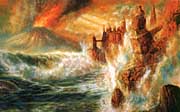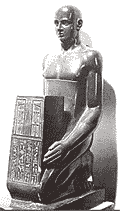 In Part I of our series on legendary Atlantis, we explored Plato's voluminous tales of the ancient island empire. One of the primary sources of information we have on Atlantis is Plato's Timaeus, one of two works of Plato that mentions Atlantis. Timaeus is the story of an Athenian Greek philosopher named Timaeus who was the keeper of an oral tradition involving Atlantis. This oral tradition had started hundreds of years earlier when Solon, a famous Athenian traveler, poet, and lawgiver, had met an Egyptian priest of the goddess Neith while traveling in the Sais district in lower Egypt. Solon, who had gone to Egypt to impress the Egyptians with the wisdom of the Greeks, found himself greatly outmatched by the wisdom of the Egyptians, to whom the Greeks were as children by comparison. The oral traditions of the Greeks, Solon was to learn, even though they were centuries old, were relatively new compared to the traditions of the Egyptians, whose roots stretched back thousands of years. However, Solon also learned from the Egyptian priest that the Athenian Greeks had actually been in existence before the Egyptians � 9000 years before even Solon's time, which was around 600 b.c. � but their civilization had been wiped out after a war with an ancient antediluvian empire known as "Atlantis".  A statue of Chief of Physicians, Psammetik-seneb, originally installed in Sais. Athens, Solon discovered from the priest, had at at that time (ca. 10,000 b.c.) been one of the most culturally and militarily superior countries on Earth, greater even than Egypt, the priest describing it as "first in war and in every way the best governed of all cities". More importantly, Athens at that time had stood as the last line of defense against the imperialist aggression of the Atlantean Empire, which had threatened to conquer Egypt, Athens, and all of Europe and Asia. The priest described Atlantis as a vast continent that lay in the Atlantic Ocean west of the Pillars of Hercules, that "was larger than Libya and Asia put together". Atlantis at that time was actually made up of several islands that were ruled over by the empire along with a substantial amount of North Africa and Europe. Not satisfied with this, Atlantis sought to conquer the entire world. All but Athens sued for peace, leaving Athens to stand alone against the awesome might of the Atlantean armed forces. However, Athens "shone forth, in the excellence of her virtue and strength, among all mankind", not only repelling the Atlantean onslaught, but driving them out of Europe and North Africa altogether. Badly beaten, the Atlantean navy limped back to their home ports. Then, in a single day and night, both Athens and Atlantis slipped beneath the waves in an incredible cataclysm. This great destruction of Atlantis and Athens was most likely a part of the Great Flood that was also recounted in the Bible as the destruction of the antediluvian world. |
Introducing Yourself (jiko-shookai) #Part 2
-
1. I am from ~ = ~ kara kimashita (~からきました?)
2. I was born in ~ = ~ umare (des) (~うまれ(です))
3. Where are you from? = (go) shusshin wa ((ご)出身は)
...
16 years ago

No comments:
Post a Comment